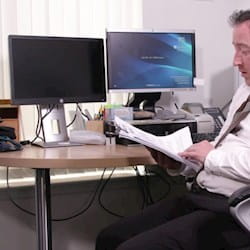RESEARCHERS writing in The Lancet have developed a clinical tool to support GPs and their teams in appropriate antibiotic prescribing for young patients with respiratory tract infections.
Over 8,000 children between ages 3 months and 16 years presenting with acute cough and respiratory tract infection were recruited to a cohort study from 247 general practitioner practices in England. The researchers then accessed hospital admissions for respiratory tract infection within 30 days.
Seven characteristics were independently associated with hospital admission including age under two years, current asthma, illness duration of three days or less, moderate or severe vomiting in the previous 24 hours, severe fever in the previous 24 hours or a body temperature above 37·8°C, intercostal or subcostal recession and wheeze on auscultation. The researchers then assigned on point per characteristic.
Patients with one point or less were assigned a “low” risk of hospitalisation (0.3 per cent) and those with two or three points were assigned a “normal” risk (1·5 per cent). Patients with four points or more were assigned a high risk (11·8 per cent).
The researchers recommend that GPs should avoid or delay antibiotic prescription in children with low or normal risk according to the tool.
Professor Alastair Hay, a GP and professor of primary care at the University of Bristol said in Pulse: "We believe use of this algorithm could represent a step-change in the care of children with coughs and respiratory tract infections in primary care. We all know we need to curb the excessive use of antibiotics, but safely reducing prescribing means improving our identification of the patients who do and don’t need them.
"To our knowledge, this is the first time anyone has produced evidence that could be used to help hard-pushed, front-line clinicians make better antibiotic prescribing decisions."
Dr Maureen Baker, Chair of the RCGP, commented: "GPs are working hard to reduce antibiotic prescribing with notable success – a reduction of 2.6m prescriptions by GPs last year alone – so a tool that can support GPs and other prescribers to identify when antibiotics are the appropriate course of treatment would be highly valuable.
"Such a tool would also be very useful for GPs when explaining to patients, and their families, that antibiotics are not always the best course of treatment, as we often come under huge pressure to prescribe these drugs."
This page was correct at the time of publication. Any guidance is intended as general guidance for members only. If you are a member and need specific advice relating to your own circumstances, please contact one of our advisers.
Save this article
Save this article to a list of favourite articles which members can access in their account.
Save to library

